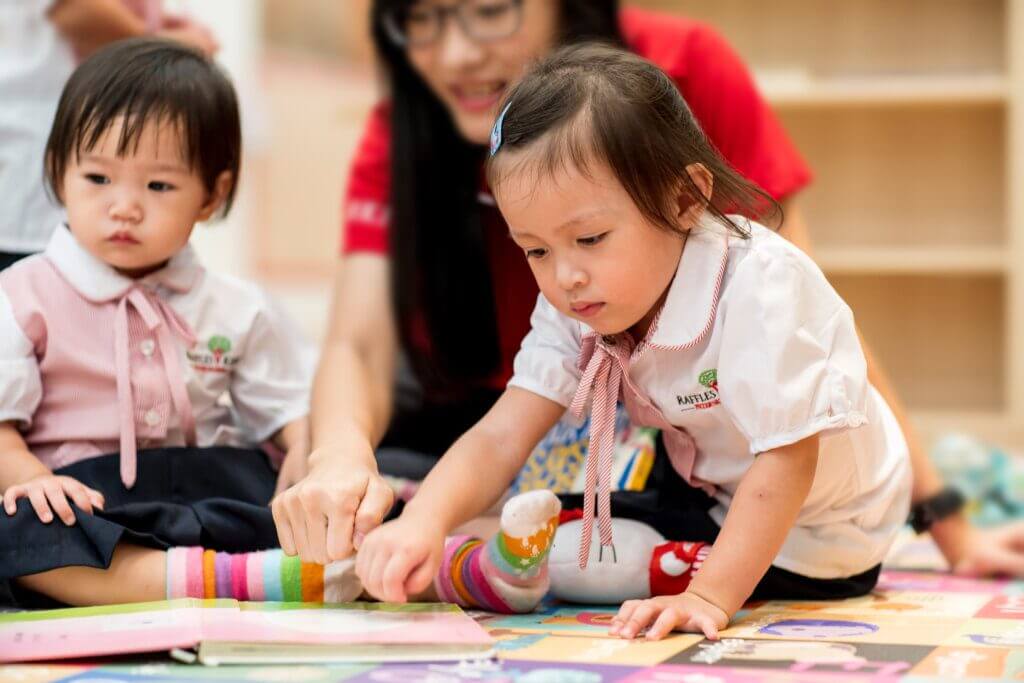Watching your little one reach new developmental milestones can be heartwarming yet bittersweet. As their children transition from infancy to toddling about with newfound independence, many parents begin to wonder if enrolling their child in a playgroup is the right next step.
What is Playgroup?
In Singapore, playgroup caters to children from 18 to 30 months old and is also referred to as the pre-nursery class. It introduces toddlers to a fun, nurturing environment where they interact with peers of the same age and prepares them for the longer hours in nursery and kindergarten.
The Early Childhood Development Agency (ECDA) in Singapore has established curriculum frameworks for playgroup and preschool, including the Early Years Development Framework (EYDF) and the Nurturing Early Learners (NEL) Framework. These guidelines advocate for quality care, holistic development, and laying a strong foundation for lifelong learning through fostering a love for discovery from an early age.
Some parents may spend a long time deliberating the necessity of signing their child up for playgroup. Here are some key benefits that you should consider:
1. Emotional Awareness and Regulation
At home, your child interacts mainly with their caregiver(s) and enjoys undivided attention. In contrast, a playgroup setting introduces them to children of the same age, fostering shared interactions and social learning.
Through activities such as storytelling, puppet play, and teacher-led discussions, your child will learn to recognize emotions such as happiness, frustration, and excitement. Teachers would also model calming techniques like deep breathing and using words to express feelings, equipping children with essential tools for emotional regulation and meaningful social interactions.
Understanding and managing emotions improves your child’s ability to engage in healthy interactions with others, going hand-in-hand with healthy social development.
2. Social Abilities
During their playgroup years, toddlers often engage in parallel play, where they engage in solo play alongside other children rather than directly with them. Would being in a group setting be of any benefit then?
The answer is yes! Parallel play is a key stage in your child’s social development. By observing peers, children pick up important social cues—such as taking turns, sharing toys, and forming relationships. At the same time, they may witness emotional outbursts or conflicts, learning how different behaviors impact social interactions.
Over time, guided activities like storytelling, pretend play, and outdoor games will help your child transition to cooperative play, where they engage with peers and build confidence in social settings. These early experiences lay the foundation for positive interactions and help support their growth as they begin to explore the world beyond home.
With the guidance of teachers, playgroup offers a safe and supportive environment to help your child navigate this new social experience in a constructive manner.
3. Cognitive Skills
Singapore’s ECDA encourages early childhood educators to adopt its iTeach Principles, emphasizing learning through purposeful play. This holistic approach nurtures both cognitive and socio-emotional development. Through hands-on experiences with new objects, people, and concepts, toddlers build foundational cognitive skills such as problem-solving and reasoning abilities.
New concepts like colors, shapes, and numbers, often introduced through songs and games, help strengthen your child’s language and memory skills. Research also shows that guided play from trained playgroup teachers enhances this learning by offering immediate and meaningful adult feedback while nurturing your child’s curiosity. This involves activities with open-ended materials like puzzles and building blocks, providing opportunities for toddlers to draw connections and recognize patterns while deepening their understanding of causal relationships. Furthermore, such activities promote independent exploration and boost problem-solving skills. Ultimately, the enriching lessons in playgroup help your child develop essential thinking skills that set the foundation for lifelong learning.
4. Adapting to Routines
Playgroup also familiarizes your child with structured routines, setting the stage for a smooth transition to nursery and kindergarten. Daily activities like morning greetings, snack time, and group play, create a sense of security and predictability, which encourages a positive attitude toward learning. As your child grows accustomed to schedules, it becomes easier for them to adapt to their remaining preschool journey and confidently embrace the new learning opportunities that come their way.
Final Thoughts
In sum, enrolling your little one in a playgroup undoubtedly offers numerous benefits, complementing parents’ efforts in guiding them toward their developmental milestones. Through purposeful play and structured routines in a nurturing learning environment, toddlers gain crucial emotional, social, and cognitive skills, helping them transit seamlessly to preschool and beyond.
At Raffles Kidz, we recognize the importance of early education in fostering your child’s overall development. Our playgroup programme offers a structured yet flexible approach with enrichment modules designed to support your child’s growth and development at every step. A central component of our approach is open play, where we encourage toddlers to explore a variety of carefully planned activities in our thoughtfully planned spaces. Find out how our programme will set your child on the path to success by visiting a Raffles Kidz centre near you!


